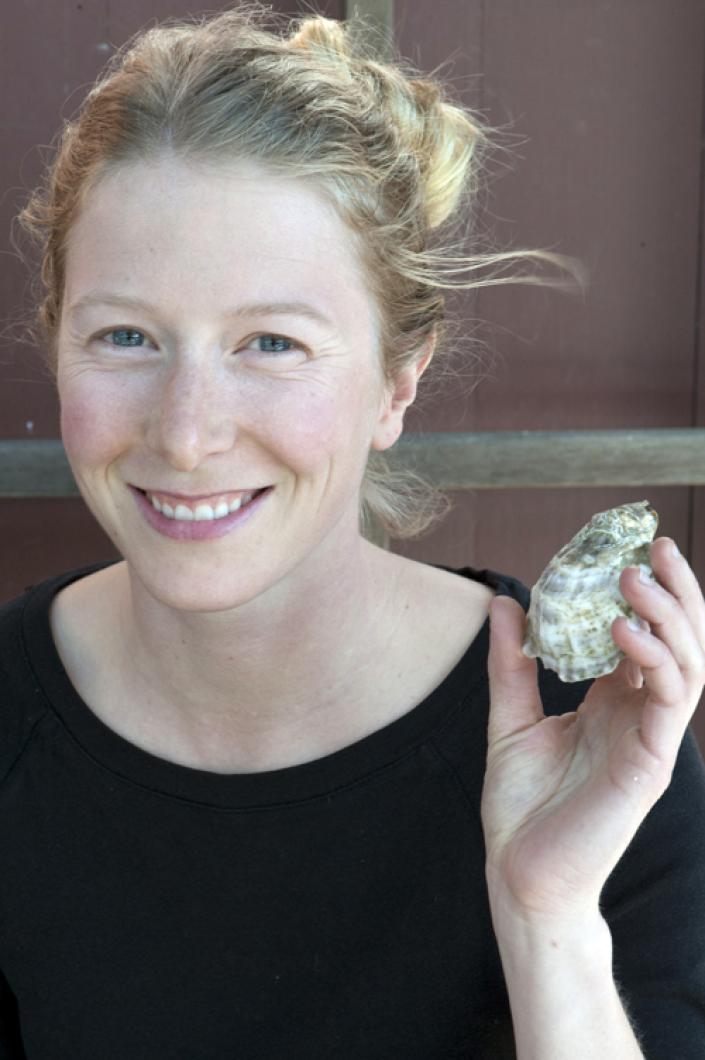Oyster shells just saw their stock go up on the Vineyard. A former employee of the Martha’s Vineyard Shellfish Group is in the early stages of a project to recycle oyster shells from seafood restaurants on the Island. The idea is to put the oyster shells back in the pond to boost oyster futures.
Jessica A. (Jessie) Kanozak, floor manager at Offshore Ale Co. on Kennebec avenue, plans to collect the shells by the truckload and deposit them into the Edgartown and Tisbury Great Ponds as culch for future oyster beds.
The initiative aims to lower the cost of increasing the productivity of wild oysters. For years shellfish constables and others have trucked in crushed shells to spread on the great ponds to promote oyster growth. Juvenile oysters require a hard bottom to grow. They either attach themselves to other adult oysters or cement themselves to rock and broken shells. They don’t survive well on a muddy bottom.
Through Ms. Kanozak’s initiative, the Martha’s Vineyard Shellfish Group applied for and just this past week received a grant for the pilot program. The shellfish group received $6,314.75 from the Edey Foundation, which has supported nonprofit environmental projects for years. The money will be used to buy a utility trailer, six mobile bins and other materials. Ms. Kanozak worked at the shellfish group as a hatchery assistant four years ago. “The idea has floated around for a long time. It would come up at potlucks and at gatherings. We’d hear it from the local shuckers. There had to be a way to recycle the shells,” she said.
Rick Karney, director of the shellfish group, said: “It just makes a lot of sense. It is a resource that shouldn’t be wasted.”
Last year through the shellfish group and the efforts of others, Mr. Karney said five truckloads of crushed shells at 20 cubic yards apiece were brought over from the mainland and distributed in the two great ponds. The shells were free, but the transportation was expensive. “That is about $350 to $400 a truckload. We aren’t saying that we will get enough shells from the restaurants, but we are saying that it helps,” Mr. Karney said.
Ms. Kanozak will concentrate her efforts on collecting shells from the restaurant where she works and she will confer with other seafood restaurants to see who and how they can participate. In the grant, she assumes the title of shell collection staff.
Mr. Karney said the shells will be stored at a site at the old Edgartown landfill, where they will be cured for a year, to be sure they are free from disease before they are deposited into the ponds.
In the grant application, Mr. Karney wrote: “The survival of wild oyster populations is dependant upon the oysters, in their planktonic larval stage, finding suitable hard surfaces to cement to, thus making shell a critical component of any oyster habitat. In undisturbed natural beds, the shell remains of previous generations uniquely create the habitat for future generations of oysters. When shell is removed from a water body with harvests, the habitat suffers. Replacing shell, referred to as culch, is a key component of oyster management. By harvesting Vineyard oysters, scallops and clams we are inadvertently removing precious habitat from the waters. Shells from locally harvested shellfish are discarded daily. As an Island with rich shellfisheries, it is alarming that more often than not shell is ending up in driveways or landfills. Native shell is a valuable resource needed for the continuation of wild oyster populations and needs to be recycled.”
Mr. Karney said last week that putting shells in the ponds also helps counteract the ongoing impact of acid rain. Farther inland, the project will lower the bulk in the Vineyard’s waste stream. The idea is not new. Mr. Karney wrote in the application that a number of communities in New Hamshire, North Carolina and on the shores of the Chesapeake Bay in Maryland already have shell recycle programs.
“Eventually it would be nice to have places where people can drop off their shells like they do in other states,” Mr. Karney said.
Ms. Kanozak said she and others were inspired by Tom Osmers, the late West Tisbury shellfish constable, who died in March 2010. She said: “He used to recycle his shells whenever he had a gathering. Tommy Osmers was the biggest voice. He said somebody should do this.”




Comments
Comment policy »